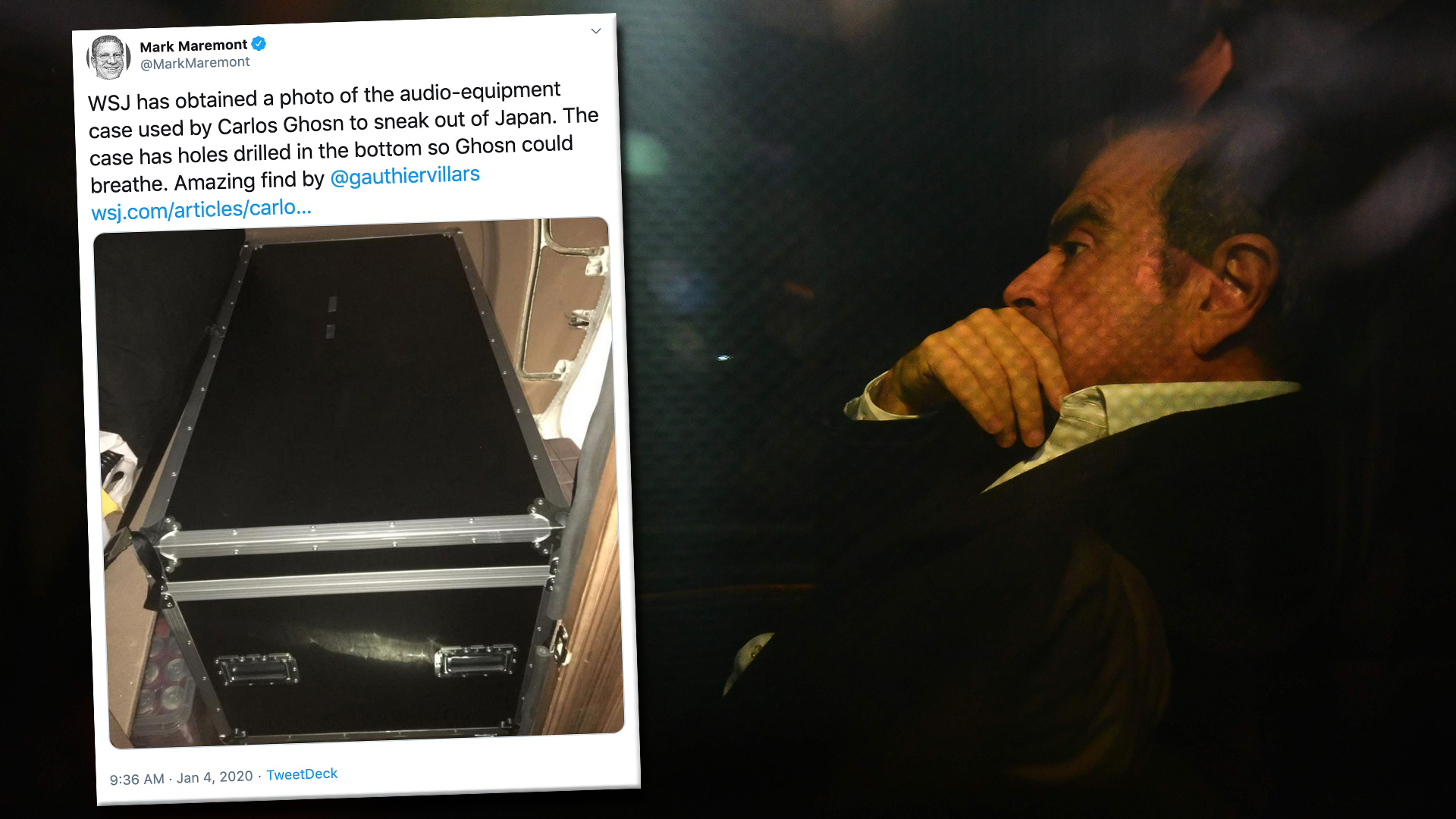

Few stories of late have been as intriguing, or worthy of a TV movie, as former Renault-Nissan-Mitsubishi Alliance head honcho Carlos Ghosn’s escape from Japan. From the get-go, the image of his pre-dawn extraction has been a wild one, with musical equipment cases, ditched authorities, private planes, and non-extradition countries. Now the picture is getting clearer, and it’s even crazier than previously believed.
First, the equipment box that was speculated on was real. The Wall Street Journal obtained a photo of the aforementioned box used by Ghosn to flee Japan and looks to be like a standard large equipment case used for concerts, festivals, and band equipment. This was an important detail to the overall plan, as according to Osaka’s airport personnel—the airport which Ghosn left via—large VIP cargo sometimes passes through without being scanned or checked by hand.
The thoughtfully assembled extraction team led by Michael L. Taylor, an ex-con, ex-Green Beret who works as an extraction specialist, then customized the concert-type equipment case for Ghosn to hide in, which featured pre-drilled air-holes to breathe through, reinforced metal corners for greater rigidity due to Ghosn’s weight, and wheels for easier movement. A picture of the case Ghosn supposedly used is below.
According to reporting by the Wall Street Journal, the disgraced auto executive’s plot to be smuggled out of Japan before authorities could properly try him for his alleged financial misdeeds, took months to plan and cost Ghosn millions to enact with the first hurdle being how to get Ghosn off the island nation. With Ghosn’s freedom on the line, Taylor—who supposedly felt sympathetic to Ghosn’s plight due to his own four years in prison for multi-million dollar military fraud—scouted multiple extraction points across the country with the solution finally presenting itself as a two-fold “security hole” at Osaka’s airport. First, Osaka’s private plane terminal is essentially a ghost-town, giving the extraction specialists far fewer chances of being stopped, questioned, and/or caught by authorities. And second, the aforementioned VIP cargo security workaround.
The escape plot was hatched and things quickly dove well into the realm of a Clive Cussler novel. The extraction team would then sneak the former executive through airport security and reach a gassed-up and ready-to-fly private plane, which Ghosn would take to Istanbul, Turkey. 12 hours later, he’d meet up with another private plane that’d ferry him to his final destination, Lebanon.
Ghosn’s decision to flee to Lebanon was well-planned, too, as the country does not extradite its citizens for prosecution, which Ghosn holds—as well as Brazilian and French citizenship. Lebanon’s reticence to comply with extraditing nationals hasn’t stopped Interpol from issuing a “Red Notice” for Ghosn, which according to the Financial Times, “seeks the location and arrest of a suspect, with a view to extradition or a similar process. Interpol’s red notices are not arrest warrants, so they do not place member countries under an obligation to detain the targeted person.” But as was stated above, Lebanon isn’t likely to comply with the international authority’s issuance.
Adding insult to injury to Nissan and Japanese authorities, Ghosn is supposedly residing in a mansion that Nissan reportedly bought and renovated for him prior to his arrest and ouster. Nissan’s brass have been trying to evict the Ghosns from the residence since the executive’s initial arrest in 2018 but have been unable to secure their removal. Meanwhile, Japan’s Justice Minister Masako Mori, stated that Japan will continue to pursue criminal prosecution of Ghosn, even while he’s abroad, telling reporters, “It is clear that we don’t have any records of the defendant departing Japan, hence we believe that he left Japan illegally”.
Ghosn, and his wife, Carole, have long-maintained his innocence, stating that Nissan’s board collaborated with the Japanese government to oust the CEO after board members felt the company was becoming too Western. Nissan has denied those charges and leveled its own against Ghosn, including unreported income and assets totaling over $100 million.
After a host of failed press conferences, Ghosn is set to give one this Wednesday, and will reportedly detail his grievances, as well as his point of view. It’s unclear if Ghosn will show any evidence verifying his side of the story. Stay tuned to The Drive as more of this wild story is likely to come to light soon.
Got a tip? Send us a note: tips@thedrive.com